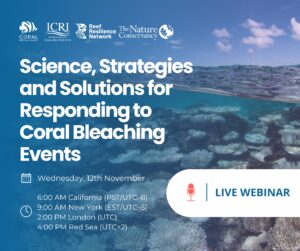Meetings Other Relevant Events


Science, Strategies, and Solutions for Responding to Coral Bleaching Events

Coral reefs are among the most vibrant and vital ecosystems on Earth, and while they are experiencing increasing pressure from longer and more intense marine heatwaves, they also continue to demonstrate remarkable resilience and recovery potential when given clean water, healthy fisheries, and protection.
To mark Coral Bleaching Awareness Month, the Coral Reef Alliance, International Coral Reef Initiative, and the Reef Resilience Network are hosting a special #ForCoral webinar where scientists and practitioners from around the world will present NOAA’s latest outlook on the Fourth Global Coral Bleaching Event and discuss its implications for reef ecosystems. Speakers will share innovative strategies to enhance coral reef resilience in the face of climate change. They will explore region-wide coordination of monitoring efforts to guide conservation priorities and share unique approaches for identifying thermally tolerant coral colonies for climate-smart restoration and conservation. The webinar will last for 75 minutes and the presentations will be followed by an open question-and-answer session. The webinar will be recorded.
It is not too late to act. There is still hope, and together—through science, collaboration, and collective commitment—we can chart a path toward a more resilient future for coral reefs and the communities that depend on them.
English
Should you have any questions or need more information, do not hesitate to contact the ICRI Secretariat
Wednesday 12 November 2025
Agenda
Welcome
Annick Cross, The Nature Conservancy
Rising Heat, Rising Hope: Resilient Reefs in a Changing Climate
Margaux Monfared, International Coral Reef Initiative
Guiding Hope: SHAMS’ Real-Time Coral Bleaching Monitoring Reveals Red Sea Resilience
Mohammed Ismail Elsayed , General Organization for Conservation of Coral Reefs and Turtles in The Red Sea (SHAMS)
Collaborative Science and Regional Action for Coral Bleaching in the Mesoamerican Reef
Aarón Israel Muñiz Castillo, Healthy Reefs for Healthy People
Beyond Bleaching: Turning Aerial Data into Restoration Action
Matthew Davies, The Nature Conservancy
Question & Answer
Closing

Annick Cros
Reef Resilience Network | The Nature Conservancy
Annick Cros is the Science Lead for the Reef Resilience Network. She transplanted her first coral nubbin to build reef resilience in Mombasa in 2002 and has worked on innovative approaches to coral reefs management ever since. She has a PhD from the University of Hawai’i in conservation genetics and 20 years’ international experience working on spatial planning, the design of Marine Protected Areas (MPA), MPA networks, and integrating climate change into coral reef conservation. In her time with The Nature Conservancy’s Asia Pacific Marine program from 2007-2012, Annick trained in Open Standards for the Practice of Conservation and has helped teams and communities worldwide design more efficient management strategies for conservation. Annick joined the Network in 2022 and now focuses on bringing the latest science to managers and support the development of new tools and approaches to coral reef conservation and MPA management.

Margaux Monfared
International Coral Reef Initiative (ICRI) Secretariat
Margaux Monfared works on Global Engagement and Ocean Policy for Blue Pangolin Consulting and serves as the International Policy and Advocacy Director for the International Coral Reef Initiative. An experienced marine biologist and policy specialist, her career spans hands-on coral reef restoration to global advocacy for reef protection. She holds an MSc in Applied Aquatic Biology and has led research and education programmes in the Maldives, Cambodia, and Honduras before transitioning to international policy roles. With several years of field experience, Margaux has focused on enhancing coral reef resilience to climate change through collaborative research, community outreach, and cross-disciplinary teamwork – yielding valuable insights into effective, science-based conservation practices. She is also a member of Leading Women for the Ocean, a global network that empowers women’s voices in ocean conservation, and the CBD Women’s Caucus. Through these and other platforms, she actively contributes to advancing more inclusive and effective ocean governance.

Mohammed Ismail Elsayed
General Organization for Conservation of Coral Reefs and Turtles in The Red Sea (SHAMS)
Dr Mohammed Ismail Elsayed is a seasoned marine scientist and the Executive Director of Coral Reef conservation at SHAMS. He was a regional coordinator at PERSGA The regional organization for the conservation of Red Sea and Gulf of Aden. With a rich background in coral reef ecology and conservation, Mohammed has dedicated his career to understanding and protecting these vital ecosystems. He has a track record of leading regional and international initiatives focused on coral reef conservation. Mohammed has contributed significantly to advancing our understanding of coral reef ecosystems and developing effective conservation strategies. His leadership and commitment to sustainable marine management have made a lasting impact on both national and regional efforts to safeguard these invaluable resources.

Aarón Israel Muñiz Castillo
Healthy Reefs for Healthy People
Aarón Israel Muñiz Castillo is a marine biologist specializing in the ecology, conservation, and resilience of coral reefs across the Caribbean and Mesoamerica. He currently serves as Marine Scientist at Healthy Reefs for Healthy People (HRHP) and Associate Researcher at the Smithsonian Environmental Research Center’s Marine Conservation Lab. His work integrates quantitative analysis, applied ecology, and environmental management to understand the health and vulnerability of coral reefs. Dr. Muñiz Castillo has authored over a dozen publications in leading international journals, contributed as a reviewer for high-impact journals, and led regional projects on coral bleaching, ecological connectivity, and reef monitoring. With over 400 scientific dives, his work bridges science, management, and regional collaboration to inform evidence-based conservation strategies.

Matthew Davies
The nature Conservancy
Matt Davies is the Data and Monitoring Manager for The Nature Conservancy’s Coral Innovation Hub in St. Croix, US Virgin Islands, with oversight of data collection and analysis across several large-scale restoration projects. He holds an MSc in Marine Environmental Management and has 10 years of experience working in Caribbean reef conservation and restoration, in both the non-profit and government sectors. A scientist at heart, Matt believes strongly in a data driven approach to reef restoration and management, yet through his career has recognized that as practitioners work towards implementing restoration at scale, increased demands for data collection, analysis, and reporting can become almost as time consuming as the restoration efforts themselves. As a result, he is passionate about building efficiency in reef monitoring through the use of cost-effective technology and automation, specializing in the use of Large-area Imaging (LAI) to create precise digital snapshots of coral reefs over time.